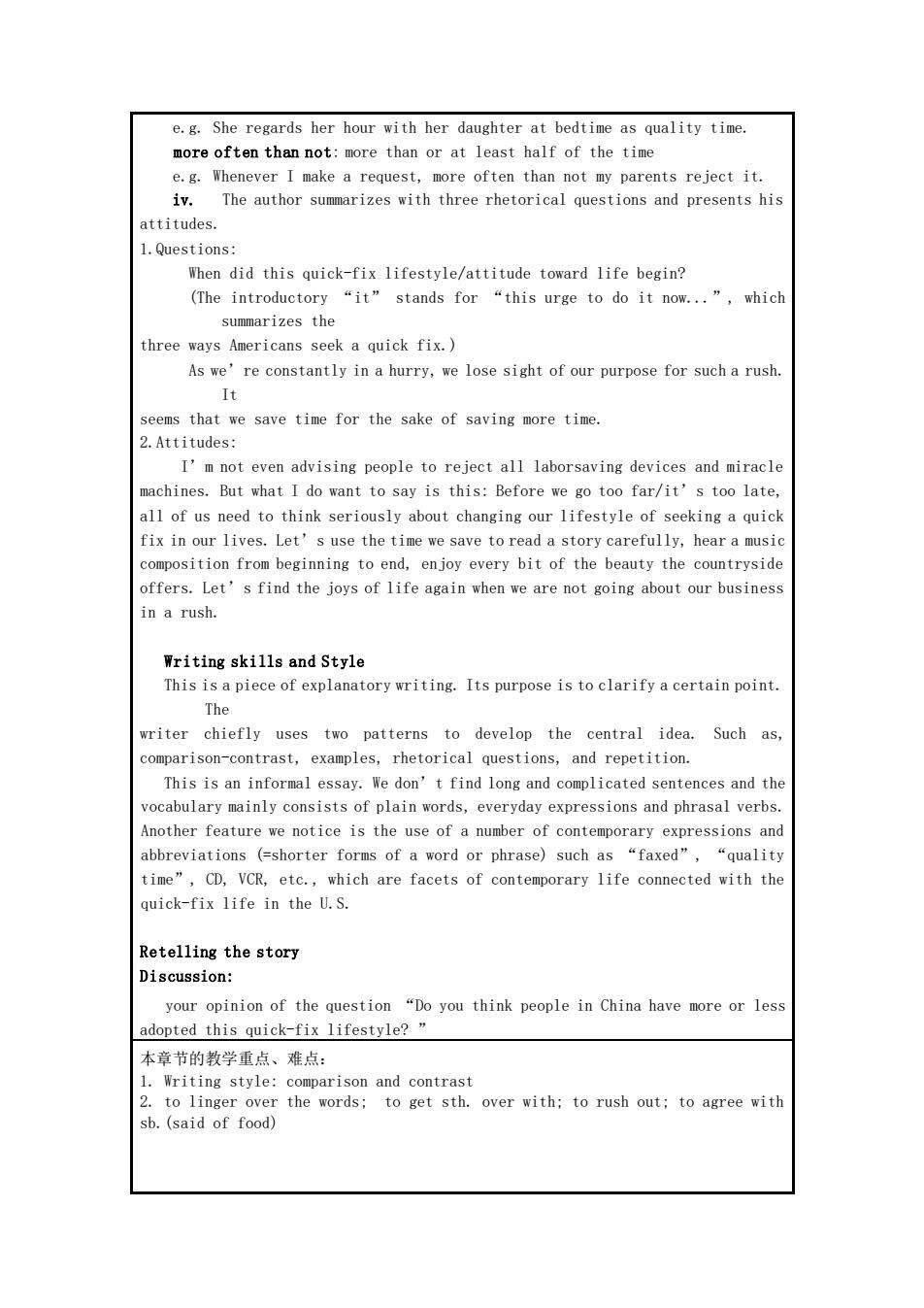正在加载图片...

e.g.She regards her hour with her daughterat bedtine as qulity time. more often than not:more than or at least half of the tim e.g.Whenever I make a request,more often than not my parents reject it. iv.The author summarizes with three rhetorical questions and presents his attitudes. L.Questions: When did this quick-fix lifestyle/attitude toward life begin? (The introductory“it”stands for“this urge to do it now.”,hic summarizes the three ways Americans seek a quick fix.) As we're constantly in a hurry,we lose sight of our purpose for such a rush seems that we save time for the sake of saving more time. 2.Attitudes: I'm not even advising people to reiect all laborsaving devices and miracle machines.But what I do want to say is this:Before we go too far/it's too late, all of us need to think seriously about changing our lifestyle of seeking a quick fix in our lives.Let'suse the time we save toread a story carefully,hear a musi composition from beginning to end,enjoy every bit of the beauty the countryside offers.Let's find the joys of life again when we are not going about our business in a rush. Writing skills and Style This is a piece of explanatory writing.Its purpose is to clarify a certain point The writer chiefly uses two patterns to develop the central idea.Such as, comparison-contrast,examples,rhetorical questions,and repetition. This is an informal essay.We don't find long and complicated sentences and the vocabulary mainly consists of plain words,everyday expressions and phrasal verbs Another feature we notice is the use of a number of contemporary expressions and abbreviations (=shorter forms of a word or phrase)such as "faxed","quality time",CD,VCR,etc.,which are facets of contemporary life connected with the uick-fix life in the U.S. Retelling the story Discussion: your opinion of the question "Do you think people in China have more or les adopted this quick-fix lifestyle? 本意节的数学重点、难点: I Writing style: 2.to linger over the words:to get sth.over with:to rush out:to agree with sb.(said of food) e.g. She regards her hour with her daughter at bedtime as quality time. more often than not: more than or at least half of the time e.g. Whenever I make a request, more often than not my parents reject it. iv. The author summarizes with three rhetorical questions and presents his attitudes. 1.Questions: When did this quick-fix lifestyle/attitude toward life begin? (The introductory “it” stands for “this urge to do it now.”, which summarizes the three ways Americans seek a quick fix.) As we’re constantly in a hurry, we lose sight of our purpose for such a rush. It seems that we save time for the sake of saving more time. 2.Attitudes: I’m not even advising people to reject all laborsaving devices and miracle machines. But what I do want to say is this: Before we go too far/it’s too late, all of us need to think seriously about changing our lifestyle of seeking a quick fix in our lives. Let’s use the time we save to read a story carefully, hear a music composition from beginning to end, enjoy every bit of the beauty the countryside offers. Let’s find the joys of life again when we are not going about our business in a rush. Writing skills and Style This is a piece of explanatory writing. Its purpose is to clarify a certain point. The writer chiefly uses two patterns to develop the central idea. Such as, comparison-contrast, examples, rhetorical questions, and repetition. This is an informal essay. We don’t find long and complicated sentences and the vocabulary mainly consists of plain words, everyday expressions and phrasal verbs. Another feature we notice is the use of a number of contemporary expressions and abbreviations (=shorter forms of a word or phrase) such as “faxed”, “quality time”, CD, VCR, etc., which are facets of contemporary life connected with the quick-fix life in the U.S. Retelling the story Discussion: your opinion of the question “Do you think people in China have more or less adopted this quick-fix lifestyle? ” 本章节的教学重点、难点: 1. Writing style: comparison and contrast 2. to linger over the words; to get sth. over with; to rush out; to agree with sb.(said of food)